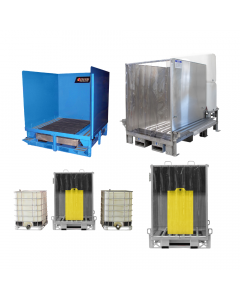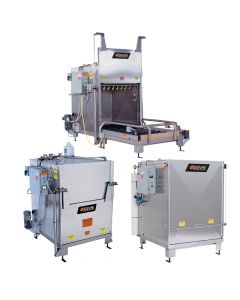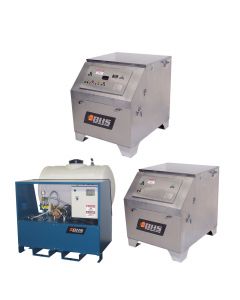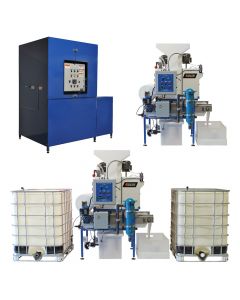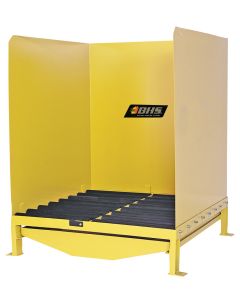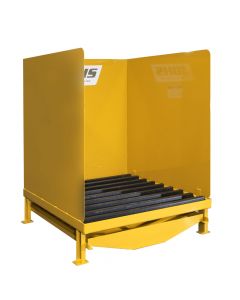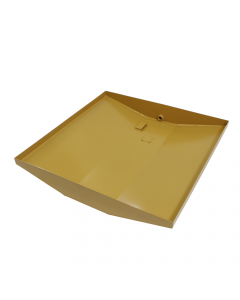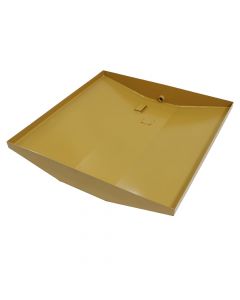We use cookies to make your experience better. To comply with the new e-Privacy directive, we need to ask for your consent to set the cookies. Learn more.
Battery Wash Equipment & Wastewater Treatment
BHS Battery Wash Equipment simplifies an essential battery maintenance task while helping to comply with strict environmental regulations. Regular cleaning with BHS Battery Wash Cabinets and Stations can prolong the operational life spans of forklift batteries and extend the productivity of lift truck fleets.
Options include labor-saving auto-wash cabinets, portable wash stations, and battery beds configured for side- or vertical-extraction fleets. To choose the ideal Battery Wash Equipment for your battery room, contact our sales team at 1.800.BHS.9500.
Using BHS Battery Wash Equipment to Improve Forklift Battery Performance
Forklift battery manufacturers recommend washing batteries regularly to remove corrosive electrolyte, dirt, and pollutants that can detract from battery performance. Failing to wash lift truck batteries can result in a number of costly problems, including:
- Increasing self-discharge rate
- Shorter operating life.
- Weakening of battery cases through corrosion.
- Voltage leaks during operation.
- Increased exposure to electrolyte for battery handling staff.
Washing batteries prevents these issues from developing, but contaminated runoff must be contained in order to prevent pollution and comply with environmental requirements. BHS Battery Wash Equipment allows battery room operators to maximize battery performance while collecting wastewater for recycling, recirculation, or disposal.
Choosing Battery Wash Equipment for Your Forklift Battery Room
The size of your battery fleet determines which battery wash products will provide the greatest return on investment. Other factors include your wastewater disposal plan, battery room floorspace requirements, and staff availability for maintenance tasks.
High-volume applications will realize significant time and staff-hour savings by installing a BHS Battery Wash Cabinet (BWC). These adjustable stainless steel systems fully enclose batteries for automated washes.
Options for BHS Battery Wash Cabinets include a compressed-air drying cycle, electrolyte neutralization, and a power scrub brush to remove collected debris. For vertical extraction fleets, an in-feed conveyor provides simple access.
Operations with lighter battery maintenance requirements may opt to wash batteries manually, in which case BHS Wash Stations provide dependable containment for wastewater and overspray. The Roller Wash Station (RWS) supports batteries of up to 4,000 pounds on acid-resistant roller beds, and simplifies transfer into and out of battery changing equipment for side extraction fleets.
Hardwood Wash Stations (HWS) are designed for overhead battery handling systems and can be custom built to meet any specifications. Both Hardwood and Roller Wash Stations include a removable drain tray for easy cleaning. Optional welded fork pockets provide easy mobility.
If you need to relocate your wash station frequently, choose the Mobile Wash Station (MWS-72), which includes a non-skid walkway for improved battery access.
Managing Wastewater from Forklift Battery Washes
BHS Battery Wash Equipment provides dependable collection of wastewater, overspray, and post-wash dripping. Once that contaminated water is collected, there are several options for safe, compliant wastewater disposal:
Create a Closed Loop System with the BHS Recirculation/Neutralization System.
The most sustainable option is to recirculate used water by connecting a Battery Wash Cabinet to a Recirculation/Neutralization System (RNS). The RNS filters wastewater down to 5 microns, reusing the cleaned water for future washes. This closed system limits water use and greatly reduces the risk of accidental pollution.
Collect Wastewater for Third-Party Disposal.
Every model of BHS Wash Equipment collects the runoff from battery washing, and waste disposal contractors can collect and process the byproduct for a fee. While this option is not as sustainable as recirculation, it should comply with environmental requirements.
Install a BHS Wastewater Recycling System for In-House Water Treatment.
Rather than hiring third-party contractors, large fleets can treat water with a Wastewater Recycling System (WRS). This automated system removes harmful particulates from water at a rate of 2 gallons per minute, and meets EPA and NJDEP regulations for safe disposal.
Learn More About BHS Battery Wash Equipment
For an in-depth look at any of these models, download a detailed PDF from the product page. Our sales staff are always ready to discuss the benefits of BHS Battery Wash Equipment. Call us at 1.800.BHS.9500 to learn more.

